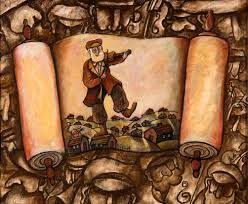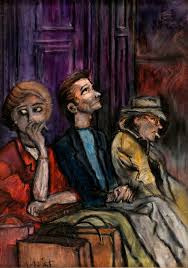
________________________________________________________
José B. Adolph nació en Stüttgart, Alemania en 1933. Su familia se trasladó a Perú cuando él tenía 5 años. Estudió en la Universidad Mayor de San Marcos. Fue un escritor y periodista peruano en muchos periódicos Su obra más conocida Mañana las ratas, una novela de ciencia ficción. Es uno de los escritores más conocidos y más prolijos de la ciencia ficción latinoamericana del siglo XX. En 1983, recibió el Primer Premio de la Municipalidad de Lima. También en ese año él ganó el Primer Premio en el concurso del “Cuento de 1000 Palabras” que le otorgo la revista “Caretas.” José B. Adolph se falleció 2008 en Lima.
José B. Adolph was born in Stüttgart, Germany, in 1933. His family moved to Perú when he was 5. He studied at the University of San Marcos in Lima. He was a Peruvian and writer and journalist for many periodicals. His most famous work Mañana las ratas, a science fiction novel. He was one of the best-known and most prolific authors of science fiction in Latin-America in the twentieth century. In 1983, he received the First Prize of the City of Lima. Also, in that year, he won first prize in the “Short-story of 1000 Words” competition, awarded by the “Carretas magazine.
José B. Adolfo se falleció en 2008.
_____________________________________
Persistencia
Gobernar la nave se hace cada vez más problemático. Los hombres están inquietos; sólo la más ardua disciplina, las más dulces promesas, las más absurdas amenazas mantienen a la tripulación activa y dispuesta.
Una humanidad que ya no se asombra de nada nos vio partir hacia el más allá: estaba ya habituada a una desfalleciente fascinación.
Comprendo a todos; estos han sido años de sucesos terribles, de convulsiones. Muertes masivas, guerras, inventos maravillosos; ¿quién podía entusiasmarse por una conquista de aquel espacio que ya nada nuevo promete a hombres hartos de progreso?
Los costos son elevados, pero ya nadie se fija en cifras. Corre sangre y corre dinero en estos años en que somos, a la vez, creadores y asesinos.
Amo y odio a mis compañeros. En cierto sentido, son la hez del universo; en otro son balbucientes niños en cuyas manos se moldea el futuro. Abriremos una ruta que liberará a este planeta del hambre, de las multitudes crecientes que ya no encuentran un lugar bajo el sol y que sólo esperan aterradas y resignadas, un juicio final del que desconfío: ¿cómo se puede ser tan supersticioso en estos tiempos de triunfo de la ciencia, del arte, de una nueva promesa de libertad como la que encarna esta nave?.
Hemos partido hace meses; en este tiempo solitario hemos recorrido la inmensidad de cambiantes colores, reducidos a lo mínimo. Nos hemos visto convertidos
en criaturas desnudas, flotando en la creación: los hombres tienen miedo. Sabían que existía este vació; lo supieron siempre. Pero ahora que se sienten devorados
por él, sus miradas se han endurecido para siempre. El final es un lejano punto que no logro construirles.
Huimos de un mundo de miseria y hartazgo; de violencia y caridad; de revolución y orden. Habremos de retornar, sin duda, pero tampoco puedo garantizárselo a ellos. Ven el vacío; no son capaces de perseguir un sueño a plenitud. No hay comunicación con un pasado que sólo recobraremos como futuro. Y mi soledad es mayor: ¡ay de los que poseemos la verdad y la seguridad! Una sola lagrima nuestra, descubierta por ellos, equivaldría a una desesperada muerte.
Pero es inmensa la recompensa: al otro lado nos esperamos a nosotros mismos, encarnados en esa libertad y en esa abundancia de que ahora carece nuestro planeta. Debemos durar, debemos resistir, no solo porque el retorno es imposible,
sino porque mienten cuando dicen preferir la seguridad de la prisión que dejaron.
La verdad, me digo, es obligatoria. Y el encargo que llevamos nos ha sido encomendado por todos los hombres de la tierra, aun por aquellos que no saben de este viaje e ignoran lo miserable de su existencia.
El viaje continuará, así tuviese que matarlos a todos y gobernar yo sólo la nave. Nadie puede escapar, si no es a través de su propia muerte: confío en sus instintos, más que en sus razonados temores. Hasta ahora no hemos encontrado las horribles pesadillas que algunos timoratos previeron. Sé que todo marchará bien, o todos moriremos juntos; si así fuera, si lo último se cumpliera, otros retomarán la esperanza y esa huída que será un gran encuentro. El cielo es negro sobre nosotros, pero miles de luces nos acompañan; son como cirios de esperanza. Ellos las miran con temor y odio; no quieren comprender que son guardianes y guías: ¿Cómo no sentirse hermano de las estrellas, que observan, comprensivas, nuestra soledad que es la de ellas?
Me siento solo, y no me siento solo. ¿Habrá alguien que pueda comprender esta atracción por un abismo que para mí no es sino una ruta más? Es cierto que a veces tengo miedo, como todos. No soy sino un hombre frente a fuerzas desconocidas: las intuyo, pero no las domino; las comprendo pero no son mías. Pero sin miedo no hay esperanza.
Y sin embargo, el tiempo es largo, sobre todo para ellos. El viaje se les aparece infinito. Empiezan a sentirse privados de toda realidad; se creen fantasmas de sí mismos. Sus ojos me amenazan, porque siempre hay un culpable. La nave cruje y se mece, la inmensidad es cada vez mas aplastante, pese a esos signos que, desde hace un par de días, nos aseguran que no hay error, que mis cálculos son correctos.
Debo anotar, pues, que ojalá se cumplan los pronósticos favorables antes que el temor termine totalmente con la confianza. Rogaré al Señor para que tal cosa no ocurra. Danos, pues, Señor, la gracia de poder cumplir nuestra misión antes que finalice este octubre de 1492.
__________________________________________________________
Persistence
Commanding the ship is becoming more and more problematic. The men are restless; only the strictest discipline, the sweetest promises, the most absurd threats keep the crew active and ready.
A humanity that no longer is surprised/amazed by anything saw us depart toward the great beyond; it is already used to a lesser fascination. I understand them all: these have been years of terrible events. of convulsions. Massive deaths, wars, marvelous inventions; who could get exited by a conquest of that space that doesn’t even promise anything new to men sick of progress?
The costs are high; but nobody pays attention to the figures anymore. Blood flows and money flows in these years in which we are at the same time creators and murderers.
I love and I hate my comrades. In a certain sense, they are the dregs of the universe, in another, they are babbling boys in whose hands the future is molded. We will open a route that will free this planet of hunger, of the growing multitudes who no linger find a place under the sun and who only wait frightened and resigned, a final judgment which I distrust: how can you be so superstitious in these times of triumph of science, of art, of a new promise of freedom such as that which embodies this vessel?
We set out months ago; in this solitary time we have crossed the immensity of changing colores, reduced to the minimum. We have seen ourselves changed into naked creatures, floating in creation; the men are afraid. They knew that this emptiness existed; they always knew it. But now they feel devoured by it; their faces have hardened forever. The end is a far off point that I can’t make real for them.
We fled from a world misery and glut; of violence and charity; of revolution and order. We will have to return, no doubt, but I can’t guarantee that to them either. They see the emptiness; they are not capable of pursuing a dream of plentitude. There is no communication with a past that we will only recover as future. And my solitude is greater; wow to those of us who possess truth and conviction! A single tear from me would be equivalent for them to a desperate death.
But the reward is immense: on the other side, we wish for ourselves, embodied in that liberty and in that abundance that our planet now lacks. We must endure, we must resist, not only because going back is impossible, but because they lie when the say that they prefer the security of the prison the left behind.
The truth, I say to myself, is obligatory. And the mission that we tack on has been charged to us by all the men of the earth, even by those who don’t know about this voyage and are unaware of the misery of its existence.
The voyage will continue, even if I have to kill them all and alone command the ship/ No one can escape, if it is not by his own death; I trust their instincts, more than the horrible nightmares that some fearful ones expected. I know that everything will go well, or we will all die together; it that happens, if the ultimate takes place, others will take up the hope, and that this escape will be a great encounter. The sky is black above us, but thousands of lights accompany us: they are like large candles of hope. The men watch them with fear and hatred: the don’t want to understand that they are guardians and guides. How can you not feel yourself brother to the stars, that observe, understanding, that our solitude is theirs?
I feel alone, and I don’t feel alone. Will there be someone who can understand this attraction for an abysm that for me is nothing but another route? Certainly, at times I am afraid, like everyone. I am only a man facing unknown forces; I sense them, but I don’t dominate them: I understand them but the aren’t mine. But with our fear, there is no hope.
Nevertheless, the time is long, especially for them. The voyage seems to them to be infinite. They begin to feel deprived of all reality; they believe themselves to be ghosts of themselves. Their eves threaten me, because there is always a guilty one. The ship creaks and rocks, the immensity is more and more overwhelming, despite those signs that, for two days now, assure us that the is no mistake, that my calculations are correct.
I should note, that, God willing, the favorable predictions are fulfilled before fear completely does away with confidence. I will pray to God that such a thing does not happen. Give, then, Lord, the grace to be able to complete our mission before this October of 1492.

 _______________________________________
_______________________________________























